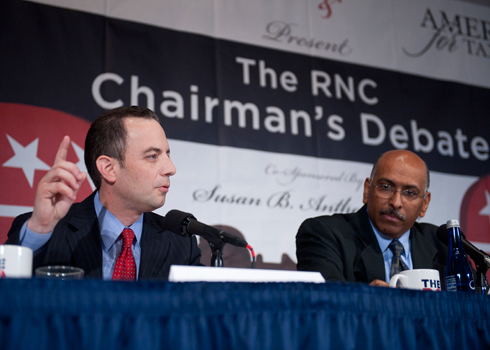The past year saw great strides forward for supporters of gay rights, culminating in the repeal in December of the military’s ban on openly gay and lesbian service members. Polls continue to show the American public is warming to gay rights, from overwhelmingly supporting the repeal of Don’t Ask, Don’t Tell to rising support for legalized gay marriage at the federal level.
[TPM SLIDESHOW: It’s Over: Senate Repeals Don’t Ask, Don’t Tell]
It seems increasingly clear that embracing some changes in the way gays and lesbians interact with society will be necessary for political viability in the future. That is, unless you’re running to be the next chair of the Republican National Committee. At their debate yesterday, the major candidates running to lead the RNC through the 2012 presidential race pledged to hold the line on gay rights, expressing concern over the repeal of DADT and vowing to keep the Republican Party in the sanctity of marriage business.
Though Republicans may be less willing overall to embrace gay rights than other groups, the party by no means speaks with one voice on the topic. The DADT repeal vote in the Congress carried a few Republican votes with it, and a handful of well-known Republicans have expressed their support for gay marriage as well.
But that’s not how the candidates for RNC chair see it. At the debate yesterday, they spoke with basically one voice and said support for gay marriage does not have a place in the modern GOP.
“There are a lot of discussions and debates about the definition of family and everyone has their own way of making it,” current chair Michael Steele, who’s running an uphill reelection race, said. “As a party though, we have said very clearly that we support this ideal [that marriage is between one man and one woman], that we support this tradition. And I think that is a very good spot for the party to be in.”
The man who seems most likely to replace Steele at this point is Wisconsin GOP chair Reince Priebus. At the debate yesterday, he echoed Steele’s words and made it clear he saw no legal case for gay marriage.
“I don’t believe that judges can rewrite the Constitution and redraft what marriage is,” he said. “I think there is a sanctity of marriage.”
“Everyone should be loved,” he added, “but at the end of the day, I believe that marriage through the sanctity of marriage should be between one man and one woman.”
Ann Wagner, the former Bush administration Ambassador to Luxembourg and a past chair of the Missouri Republican Party, told the crowd at the debate that she’s also opposed to gay marriage — and she knows personally that united Republican opposition to the practice can help lead to legal setbacks for the gay rights crowd.
“I also think it’s wonderful as a state party chairman as I was to watch these kinds of values reaffirmed legislatively,” she said. “When we won the majority in both houses in Missouri for the first time in 50 years, and then elected a Republican governor, we were able to pass a constitutional amendment in Missouri that in fact reaffirmed your 80 percent center-right beliefs that marriage is between one man and one woman.”
After the debate, Wagner told me she’s also personally opposed to repealing DADT, a view she said was shared with the mainstream GOP.
Maria Cino, a longtime Republican Party operative who carries the support of the gay marriage-supporting Dick Cheney, offered the least direct promise to ban gay marriage, though she expressed her opposition to the practice and promised to “support the Republican Party platform.”
Former Michigan GOP chair Saul Anuzis — the first man to enter the race this year — toed the line on gay marriage in the debate as well.
“I think very straightforwardly marriage is both a religious and a cultural institution that has existed for over 2,000 years,” he said. “I think it is a natural aspect of life, and I think that marriage is between a man and a woman.”
Anuzis also told me he personally opposed the repeal of DADT, at least as long as military leaders like the head of the Marines were opposed to it. I asked him if he worried that the hard line opposition to gay marriage and continuing concerns over DADT repeal could alienate voters who seem to have an increasing interest in gay rights.
“Not really,” Anuzis said. “I think we represent the mainstream of America. I think most of America agrees with us on the general issues, including the social issues.”
“Part of the issue is to be both tolerant and not mean-spirited in respect to how you approach it,” Anuzis said, referring to the gay rights debate. “And I think the tone has changed significantly over the years. I think that matters, and I think that’s a good thing.”









